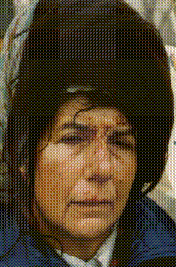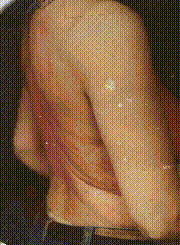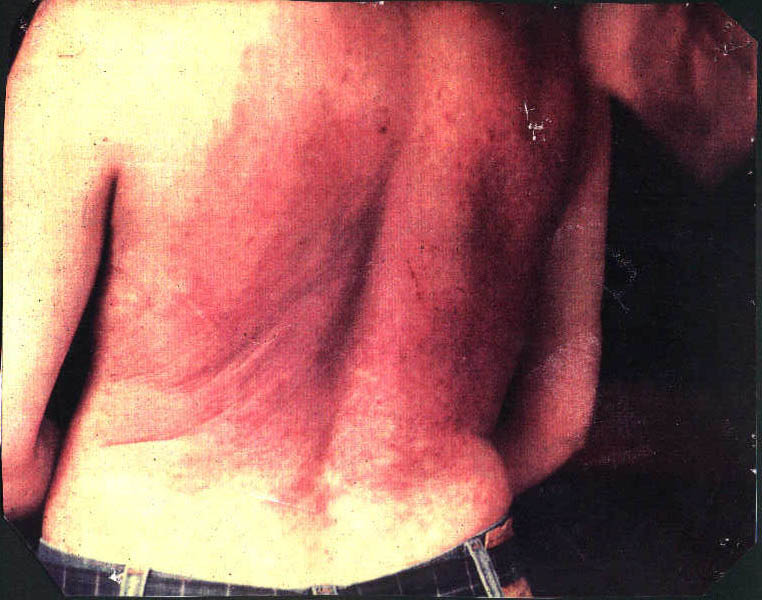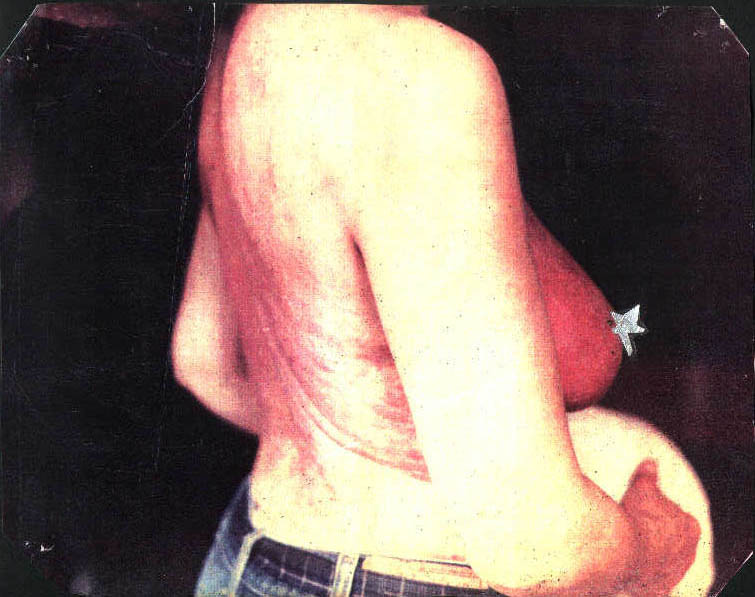MYSTERY!


TERRIBLE NIGHTMARE OF THE HUNTED WOMAN
U.S. GOVERNMENT ELEMENTS CONSPIRE
THE TRUTH THAT SHOCKS
Washington is first and foremost a political town. As such,
the gap between those supporting the political machine and those
opposed, is often glaringly at odds. Washington is not a fable,
nor are many upbeat tunes composed in its honor. The city is distinct
in that it respects a certain concept: that of freedom of speech.
Scores of demonstrations have passed through the capital
over the years. As a rule, renegade Americans are roped into the
mall, or area adjacent to the Washington Monument. An occasional
lone person recognizes the futility of confining protest and takes
their grievance to the street.
Conformity has a high priority in Washington. To those
who have accepted and come to overlook this bland formality, the
sighting of Concepcion Picciotto is a refreshingly unusual sight.
Her name is not a household word, her story not splashed across
morning dailies. Yet Dona Picciotto, by force of her statement
alone, deserves attention. In a time where discontents are encouraged
to write their congressmen, Concepcion Picciotto, having tried
this and failed, has chosen to present her case directly to the
people.

A woman has been seen walking
the streets of Washington wearing a huge wig. In her hand is a
sign detailing the horrors she has experienced. Words such as
NAPALM, TORTURE, HITLERS, RADIATION, inevitably catch the eye
of the passerby. Many are wont to ask after this woman. Who is
she? Why the wig? What conditions have led her to-this? Those
who have stopped to inquire as to her purpose, her reason for
the masquerade, are struck by the discrepancy between the brutal
language on the placard and the words the woman speaks.
Dona Concepcion Picciotto has been singled out. Circumstances
have seen to it that her life be one of unending protest. This
whirlwind of activity is no pointless dramatization, but one from
which she hopes to see results.
Concepcion Picciotto is a Spanish born, naturalized citizen.
Her marriage to a Sicilian industrial  expert
in New York was doomed from the start. In the midst of divorce
proceedings a concerted agreement at destruction was reached by
her husband and the courts, Dona Picciotto, as a result received
less than fair treatment under the law. What she did receive was
abuse in the form of (a) no right of entry into`her home, (b)
no right to possess what had been her possessions, and (c) no
visitation rights with her child. This denial has, for the past
three years, been rigidly enforced. Dona Picciotto, quite understandably,
is enraged: "Why me?,I have done nothing wrong. What is so
special about me that everyone wants my destruction?" These
questions, like the resonant echo of a paranoid mantra, have come
to enter and possess her very being. She is obsessed with her
predicament, just as we are with ours.
expert
in New York was doomed from the start. In the midst of divorce
proceedings a concerted agreement at destruction was reached by
her husband and the courts, Dona Picciotto, as a result received
less than fair treatment under the law. What she did receive was
abuse in the form of (a) no right of entry into`her home, (b)
no right to possess what had been her possessions, and (c) no
visitation rights with her child. This denial has, for the past
three years, been rigidly enforced. Dona Picciotto, quite understandably,
is enraged: "Why me?,I have done nothing wrong. What is so
special about me that everyone wants my destruction?" These
questions, like the resonant echo of a paranoid mantra, have come
to enter and possess her very being. She is obsessed with her
predicament, just as we are with ours.

It is possible to retrace favorable
aspects of American History through the cinema. In a darkened
theater we pay our fare and meet John Doe or watch as Mr. Smith
Goes To Washington. By effortlessly dropping our preconceived
notions of what is real and what is not we grow absorbed in the
tale before us. These cinematic creations, these fantasy rebels
who, by strength of their argument and thoroughness of their reasoning,
forced the people in power to stop and listen, are Concepcion
Picciotto's forebears. Granted, her means of expression is outlandish,
yet this outlandishness is all the more appropriate to the time
in which we live. Whereas the isolated, solitary activist of yesteryear
stood on a soapbox with his oratory, Dona Picciotto sports a monstrous
wig in defiance of police, reasonable behavior, and her own natural
intelligence..The scales of justice may be blind, but we are not.
Concepcion Picciotto asks that she be heard, as well as
seen. Although her extravagances are likely to raise eyebrows
and cause tongues to wag, it is difficult to conscientiously banish
her image from one's mind. Whatever pacifists reason over protest
and behavior which does not conform, Concepcion is enough like
each of us to consider taking an interest in her. Newspapers,
TV and radio stations are intrigued by her, but inevitably balk
at greater distribution of her story, The FBI and ACLU have received
her, only to show her as quickly to the door through which she
entered. Members of the House and Senate greet her with smiles
and professional thugs who forcefully remove her from the surroundings.
President Carter treats her registered letters the way normal
people treat unsolicited junk mail. The Catholic Church, of which
Dona Picciotto was a member, offered assistance if she agreed
ta brainwashing treatment. These institutions seem unanimously
agreed in their unwillingness to assist a woman in need. The question
that needs to be asked is: WHY?
Apart from being a breathing, thinking, feeling human being,
Concepcion Picciotto is a potent representation of this period
in the history of mankind. In a city laden with symbols she is
of particular interest. By shunning mystique, she hides nothing:
neither her torment, her displeasure with the way life turned
out, or her treatment by officials in power. The courageous stand
of this woman is to be admired; her solitariness and isolation
to be feared; yet both these aspects ought be discussed. Ultimately,
her problems are the government's problems, her complaints the
complaints of us all. As she stands before the Goliath of rights
denied, Concepcion Picciotto is the ideal archetypal lone figure
for our time.
DEMAND SPEED ACTION ON HUMAN RIGHTS
LEFT BEHIND IN THE HUMAN RIGHTS MOVEMENT
THE LAWLESS UNITED STATES JUSTICE'S
DISTORTS TRUTH
Concepcion Information List
| Conchita Personal Story
Photographs | The
President's Neighbor

